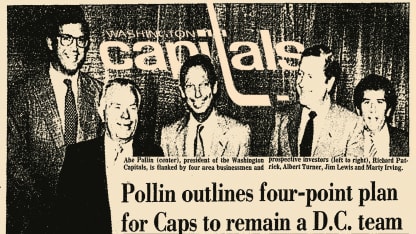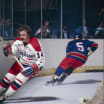When it comes to great saves in Washington Capitals history, Braden Holtby's paddle stop on Vegas' Alex Tuch in the waning minutes of Game 2 of the 2018 Stanley Cup Final stands head and shoulders above them all. But Holtby's distinction is limited to saves on the ice. Forty years ago this summer, a collaborative "save" was executed here in the greater DMV, one that kept the Caps from folding or merging or moving to another city, and ultimately setting the table for Holtby's heroics some three and a half decades down the road.
"Save The Caps" Was Caps' Greatest Save
Forty years ago this summer, the Capitals narrowly avoided moving or extinction; here's how it happened

Forty years ago at this time, hockey fans in the area were on pins and needles as they awaited the fate of the Caps for the upcoming 1982-83 season. Would the Capitals be playing their ninth NHL season at Landover's Capital Centre, or would they move to another city? Or would the Caps possibly merge with another struggling NHL club, or maybe even fold up and disappear forever? Each of those scenarios was possible, and Caps fans of that era didn't just sit on their hands and wait to learn the fate of their team. Instead, they mobilized and formed the "Save The Caps" committee.
By summer's end, the grass roots work of the "Save The Caps" committee combined with the arrival of three important new figures on the D.C. hockey scene saved the day for Washington's struggling NHL team.
Here in this space two and a half months ago, we wrote about how original Caps owner Abe Pollin beat the odds to get an NHL expansion team for Washington in early June of 1972. But after the Washington franchise was granted entry into the League on June 8, 1972, highlights were few and far between on the ice for the nascent Capitals. The team won only eight of 80 games (8-67-5) in its opening season of 1974-75, and it missed the playoffs in each of the first eight seasons of its existence, doing so in an era in which as many as 16 of 21 teams made the Stanley Cup playoffs in some of those seasons.
By the summer of 1982, the Caps and Pollin had reached a point of reckoning. The team owned a cumulative 163-375-102 record - an average of just over 20 wins a season - and it had lost a reported $20 million over those eight seasons. Pollin, who worked tirelessly to get the franchise for Washington a decade earlier, had grown weary of the financial losses, the lack of success and the lack of progress his team had shown to that point, and he was looking for change. The change Pollin was seeking was any that would stop his wallet from bleeding profusely.
That tumultuous summer of 1982 started ominously, but it finished amid a flurry of changes that ultimately augured a new and prosperous era in Washington Capitals hockey, eventually leading to a new downtown D.C. arena a decade and a half later, the Ted Leonsis era of Caps hockey, the Alex Ovechkin and Nicklas Backstrom era of Caps hockey, and ultimately, Holtby's miraculous save and the team's first-ever Stanley Cup championship in 2018, just over a week after the goaltender's dazzling Game 2 stop.
Pull up a chair, and we'll tell you how it all went down.
After starting the 1981-82 season - the eighth of the franchise's existence - with a 1-12-0 mark, Pollin made a change at general manager in early November of 1981, firing Max McNab and installing Roger Crozier on an interim basis. Crozier also briefly took the reins as head coach of the team before Bryan Murray was promoted from the AHL Hershey Bears to replace Gary Green behind the Washington bench. These changes took place in November, when Pollin also assured media and fans that the Caps would remain in the area until at least the year 2000. Under Murray's tutelage, the Caps were much better, finishing the season at 25-28-13. But the team's feeble start doomed it to an eighth straight year of missing the playoffs.
One of the first signs of real trouble came in mid-season, several weeks after Crozier and Murray began work at their new posts. In the Dec. 31, 1981 edition of The Washington Post, the late, great Robert Fachet wrote of a possible merger between the Caps and the Colorado Rockies, who began their NHL life as the Kansas City Scouts. The Caps and Scouts came into the League together as expansion twins in 1974-75. The Scouts failed after just two seasons in Kansas City, moving to Denver to become the Rockies. But the team continued to lose money in its six seasons in Colorado's capital city.
Fachet's story noted that the possibility of a merger between the two Caps and Rockies had been discussed, and in that scenario, the combined team would play and be based at Capital Centre. The headline of Fachet's story read, "Pollin Downplays Merger," and the piece quotes the Caps' owner as saying, "I would consider it far, far out. It's probably not going to happen."
League president John Ziegler stated, "It was one of many, many options. The idea was to take the sensible as well as the far out. At the moment there is no serious pursuit of that option, but of course that doesn't mean there won't be at some time in the future."
But really, how "far out" was it? The League had merged two teams less than half a decade earlier, combining the Cleveland Barons and the Minnesota North Stars into one club in the summer of 1978, and contracting the League from 18 to 17 teams in the process. And at the time of that Cleveland/Minnesota merger, there were whispers of Washington being the second half of that merger, replacing Minnesota.
Of the four NHL expansion teams that began NHL play in 1972 and 1974, one (Kansas City) moved after two years, one (Atlanta) moved after eight seasons and another (Washington) was on life support. The other (the New York Islanders) just won the third of what would become four straight Stanley Cup championships.
Also worth noting, the Cleveland half of that 1978 merger began its life as the California Seals - later known as the Oakland Seals and the California Golden Seals - before it pulled up stakes and moved to western Ohio in the summer of 1976. After operating as a six-team circuit with no franchises moving or folding for a quarter of a century, the NHL added six new teams in 1967, then followed by adding two more teams in 1970, two in '72 and two in '74. In less than a decade, the League had tripled in size, but several of its franchises were clearly struggling.
At an NHL board of governors meeting at D.C.'s Mayflower Hotel in early February of 1982, the Rockies formally requested that they be permitted to move the team to the New Jersey Meadowlands. Previously, Kitchener, Ont. and Seattle had been mentioned as possible landing spots for the beleaguered Denver franchise.
The governors were in D.C. in the first place because the 1982 NHL All-Star Game was being played at Capital Centre on Feb. 9. While the Caps were hosting one of the League's showcase events - and doing so for the only time in their history - the spotlight was being diverted by the League-wide hand wringing over the fate of the Rockies.
A month later, came a worrisome piece from Fachet in the Post entitled: "State of the Capitals: Pollin Stands Firm as Profits Sag." Fachet led with specifics in his opening paragraph:
A confidential National Hockey League report reveals that the Washington Capitals, despite an average attendance this season of 11,306, have generated only $2000 per game in gross receipts more than the Colorado Rockies, who are close to bankruptcy with an average crowd figure of 8,040.
"From a financial standpoint this has been a very bad season, but I don't know whether it's been any worse than the last three," said Pollin in the March 13, 1982 edition of the Post. "I am continuing to pour money into the team. We have had considerable losses, many millions of dollars, but I just kick myself and keep going.
"I've always felt that once the team was competitive, the town would respond and we would find ourselves in a sellout situation. I still think so and everyone in the league thinks so. We've just never provided the opportunity for the town to prove its interest in a winning team, because we haven't had one.
"We dug ourselves a hole this year (1-14 at the start) and we never came out of it. I thought we would be reasonably competitive with the other teams in the Patrick Division, but that start was too much of a handicap. It's not over yet, of course, but it certainly doesn't look good."
Pollin took responsibility for not giving the local fans a winning team, a problem that stemmed from a combination of onerous and oppressive - to the expansion teams, anyway - expansion draft rules set forth by the League in those days. Unlike modern expansion franchises such as Vegas and Seattle, which were able to stock their rosters with actual NHL players, expansion teams from the early 1970s were set up to fail; the League was much more invested in banking the franchise entry fees of its newest members than ensuring even a modicum of success for those teams. The Capitals and Scouts paid a $6 million entry fee to join the League and were "rewarded" with nickels worth of talent for their dollars in the 1974 expansion draft.
While earlier expansion teams such as Buffalo and the New York Islanders broke free from those expansion draft constraints with shrewd scouting and drafting, savvy personnel moves and a wealth of patience, the Caps' hockey operations team of that era exacerbated the draft disadvantage and stunted its own growth with uninspired scouting and unwise deals. Washington infamously went bust with its first-ever amateur draft choice of defenseman Greg Joly, a distinction magnified by the fact that Joly was the first overall pick in that 1974 NHL Amateur Draft. Meanwhile, the Islanders chose future Hall of Famer Clark Gillies three picks later in that '74 draft. And in the second round, New York grabbed Hall of Famer Bryan Trottier three picks after the Caps chose Mike Marson with the first pick of that round.
Having forged the worst record (8-67-5) in NHL history in 1974-75, the Caps would have also had the first overall choice in the 1975 Amateur Draft, had they not traded it to Philadelphia. That June 4, 1975 trade sent Washington's first-round pick (first overall, again) to the Flyers for Philly's first-rounder (18th overall in what was an 18-team league at the time), and forwards Bill Clement and Don McLean.
Eight days before that trade, Clement scored the final goal of the 1975 Stanley Cup Playoffs, a goal that gave the Flyers a 2-0 lead in Game 6 of their Cup Final series vs. Buffalo. That win sewed up Philly's second consecutive Cup title, and the Flyers loaded up for another run by taking Mel Bridgman with that first overall pick obtained from the Caps in the Clement deal. While the overall quality of the '75 draft wasn't on a par with the class of '74, Bridgman played in 977 NHL games, second among all players chosen in '74. Later in the first round, the Caps chose Alex Forsyth with the 18th overall pick. Forsyth skated in one NHL contest with the '76-77 Caps before retiring at the age of 23, after the 1977-78 campaign.
After giving up the first overall pick to get two-time Cup champ Clement from the Flyers, the Caps made him their captain before the start of the season, but he wouldn't be a Capital for long. Clement was Washington's All-Star representative at the League's All-Star Game on January 20, 1975, midway through the team's second season of existence. A night later, Clement suited up for the final time in a Washington sweater in a 5-2 home ice loss to the Isles, a setback that saddled the Caps with a 3-39-5 record for the season to that point. The day after that defeat, Clement was dealt to Atlanta for Jean Lemieux, Gerry Meehan and the Flames' first-round pick in 1976. Later that evening Clement suited up for the Flames, who were in Philly to start a set of back-to-backs. By the time that back-to-back set of games ended on the night of Jan. 23, Clement had suited up for four games in as many nights, wearing three different uniforms in the process.
That's just one major and glaring example, but numerous personnel mistakes were made, mistakes that kept the Caps at or near the bottom of the League's standings for eight seasons.
With days left in the '81-82 regular season, Fachet wrote an April 3, 1982 piece headlined "Pollin Is Silent on Reports of Capitals' Sale or Merger."
Conflicting reports were swirling at this point, one having the Caps merging with Colorado and moving to the New Jersey Meadowlands, and another claiming that Pollin was "no longer interested in a merger with the Rockies" because he found "a buyer for the whole package in Washington."
NHL president John Ziegler had this quote on the Washington market: "Washington can be one of the star franchises in this league. It's a viable franchise as far as entertainment, attendance and area, but unfortunately it has never had a playoff game in the building. Colorado has been a problem for the league, but I don't consider Washington in the same context.
"There is a concern, certainly, when Abe Pollin has expressed himself that the burden of both basketball and hockey is such that he is considering selling the hockey team. Once you reach that position, there has to be concern.
"Any merger of teams is emotional, and moves you into an area of competitive problems. The transfer of one franchise to the Meadowlands is difficult. Moving out of two markets to one in the middle of three other teams doubles the problems. It's a Herculean task."
Days later the Caps concluded the 1981-82 season with a 26-41-13 record. The summer - or at least, the offseason - of "Save The Caps" was underway, and the phrase was still a couple months away from birth. Aside from the usual postseason post-mortem articles, the Caps weren't in the news much again until mid-May.
On May 14, a Kathy Blumenstock piece appeared in the Post, headlined: "Move Unlikely, Change Certain for Capitals." Interim GM Crozier is quoted as saying, "At the present time it's all go, there'll be a team (here) next season."
Additionally, Caps ticket employees informed Blumenstock that business is "… about average, maybe a little above, for this time of year."
"Most people in our organization are in the dark and are afraid to say anything," said one Capitals executive who asked not to be identified. "The last thing they want is their name in the newspaper."
Over the next month, most of the news on the Caps related to on-ice personnel. Crozier made a pair of draft day deals in mid-June, one with Calgary to acquire Ken Houston and Pat Riggin and the other with Buffalo for Alan Haworth, who is now a Capitals scout. Washington also grudgingly used its first-round pick (fifth overall) on Kitchener (OHL) defenseman Scott Stevens after Philadelphia swooped in and took the player the Caps truly coveted, center Ron Sutter, with the fourth overall choice.
A day ahead of the draft, the Post's Dave Kindred penned a column entitled "Capitals Mystery Continues on Eve of Draft." Kindred noted that the Caps hadn't yet sent their season ticket renewals out, and that season tickets were ominously not yet for sale. On the hopeful side, he also wrote: "Two Northern Virginia attorneys representing a group showed interest in buying the team, which reportedly lost $3 million last season."
A day after the draft, Kindred issued a follow up column titled: "Pollin a Gambler With Chips Down." In this piece, Kindred suggests that Pollin wouldn't have authorized Crozier to make the draft day moves to improve the team unless it was staying in D.C. In addition to the trades, the Caps also drafted 30-year-old Czech League veteran Milan Novy with a pick obtained from the Sabres in the Haworth deal, and they signed him to an NHL contract.
On June 15, Blumenstock wrote a piece in the post on Pollin's search for new investors and his determination to "make an arrangement" to keep the team in town. "We're looking for investors," said Pollin. "We have two or three good prospects now but nothing definite. If that doesn't work out, we'd have to look elsewhere.
"My first preference is to keep the team at Capital Centre."
This article also contains the first mention we could find of Caps president Dick Patrick, who eventually did ride to the rescue later that summer as an investor.
Richard M. Patrick, a Virginia attorney who is the son of former New York Ranger Muzz Patrick and cousin of Craig Patrick, the current Ranger general manager, said yesterday, "That would be nice, but I haven't done any serious moves. I have talked to a few of my partners about getting into that (owning a hockey team) or another sports franchise, but no, I have not entered any negotiations on the Capitals."
A week later came another Blumenstock piece, "Ziegler: Capitals Option Is a Move." In this article, Ziegler stated that a move to another city was still a possibility for the Caps.
"Abe Pollin has indicated publicly that he is looking for new partners or investors," said Ziegler. "His first choice is the operation of the club in Washington, but he would also consider operation of his team in another city."
A day later, on June 23, came an alarming Blumenstock article: "O'Malley: Economic Pressure May Force Capitals' Move." With Pollin mostly silent as to the state of his hockey team, Capitals legal counsel and alternate governor Peter O'Malley was sought out for his thoughts, and he obliged while attending an NHL Board of Governors meeting in Toronto.
"All along Abe Pollin has quietly sought out ways to keep the team in the city," said O'Malley. "But I think now the situation economic might force other alternatives."
Blumenstock reported that financing terms of the Capital Centre required both the Capitals and the Bullets to remain as tenants. Reminded of the onerous issues of the arena's lease, O'Malley responded: "No problem is insurmountable."
Asked a potential timeline for settling the team's uncertain status, O'Malley's response was alarming: "Fast. At a certain point, events dictate. That's what I meant when I referred to the situation economic - schedules for events in the building have to be made up."
With summer just getting underway, the crisis rapidly reaching a boiling point. The Caps' situation was constantly in the local papers and on the local airwaves, but no firm solutions were anywhere on the horizon as each day brought the team closer to the start of the next season while plunging it further into a state of limbo.
On June 25 Blumenstock and Fachet co-authored an article entitled: "Two Groups Express Interest in Buying, Keeping Capitals Here." The second sentence of the piece showed how dire the situation had become: "Details were not available, but sources indicated the negotiations are the last possibilities for survival of hockey at Capital Centre."
Another O'Malley quote shed even more light on Pollin's thinking. "If Abe Pollin was willing to see the Capitals move, he could sell the team tomorrow," said O'Malley. "Abe has done everything possible, above and beyond what is reasonable, to try to make the thing viable here. Now after putting a great personal fortune into it, he has made a policy decision that he can't go it alone any longer."
O'Malley's statement can be interpreted as one last appeal for local investors to step forward to keep the Capitals in Washington, before they disappear. Both Pollin and O'Malley have been shocked by absence of a campaign to save the Capitals since it first became apparent in late March that the team might move.
Shifting the club could be difficult, however. First, there is the matter of satisfying the Equitable Life Assurance Society of America, which holds as $20 million bond as financing for Capital Centre. Pollin might persuade company officials to accept an indoor soccer team, plus Georgetown basketball, as an alternative to the hockey team specified in the loan. If not, he could be required to pay the annual rental now supplied by the Capitals, believed to be about $560,000.
The most likely location for a shifted franchise is Seattle-Tacoma, which has two possible facilities (Kingdome and Seattle Center Coliseum) and a third (Tacoma Dome) that should be finished by March.
Readers of the Sunday, June 27, 1982 edition of the Post were awakened with another ominous headline splashed across the wide of section E1, the front page of the sports section, Ken Denlinger's column entitled: "It's Time For Pollin to Ask for 'HEEEELLLLP'"
Denlinger's column focused on the lack of concern from locals as to the hockey team's fate.
There are no fans marching on government to demand a stay for the Capitals; no newspaper campaigns to save the team; no Prince George's County officials charging his door and offering tax relief. Eight years of agony, Lord only knows how many millions melted and his town dismisses the Capitals as quickly as they would a bad dream.
A day later, the indefatigable Blumenstock reported that ex-Caps coach Gary Green, cut loose from his position the previous November, was a member of one of several groups who were mulling a possible bid for the struggling franchise.
On June 29, Steve Butchock of The Washington Times wrote the alarmingly titled article: "Capitals may cease to exist in 30 days"
The Capitals days are numbered as the Washington franchise in the National Hockey League, and that number is 30.
The Capitals have set a self-imposed of 30 days for either the infusion of fresh money or the surfacing of a legitimate buyer, or the team ceases to exist.
O'Malley tells Butchock the deadline is in 30 days because schedules need to be finalized, divisional realignment needs to be settled with the former Colorado Rockies moving east and playing in New Jersey in the fall. Asked for a specific date, O'Malley replied: "Thirty days from today, give or take a day. It's at the end of July."
But the Caps can't wait 31 days, never mind a year. The franchise, if no investors are found, will have to be moved for the coming season. Or dissolved. Time is becoming the dominant factor and O'Malley said that Caps' fans must now realize the city is in serious jeopardy of losing the team.
But the 30-day deadline is a reality. Once certain things happen and there are only so many days until the season is about to begin, O'Malley emphasized, there are certain things that no one can roll back.
In the June 30 edition of the Post is a small - but ultimately important - four-paragraph story titled: "Fans Form Group to Save Capitals."
A committee calling itself Save Our Caps was formed last night by a group of local hockey fans in an effort to ensure that the Washington Capitals remain in Capital Centre for the coming National Hockey League season.
In a meeting at Maruk's restaurant in Alexandria, it was decided that a fund-raising drive would be undertaken in the coming weeks to purchase a few thousand season tickets and pledge them to charities.
The drive would culminate in a hoped-for telethon - at Capital Centre.
"We want to set an example of what a community can do for a sports franchise," said committee organizer Terry Coffman. "This effort is for the town. We lost the Senators and the Dips. We do not want to be labeled as a bad sports town."
In the July 6, 1982 edition of the Post, Blumenstock reports that noted player agent Art Kamensky is one of a few groups showing interest in purchasing the Capitals. At this point, Kamensky, Green and an unknown group of buyers from Los Angeles are showing interest in buying the team from Pollin.
Later in the same piece, Blumenstock quotes SCC spokesman Larry White of Olney: "I talked to Mr. Pollin and he promised to rethink his position. We know we haven't much time. But I just can't think of losing the Caps, no matter what the reasons behind it. I first went to a game four years ago and fell in love with it and bought four season tickets. Since then, seven of my employees have become fans who never saw hockey before.
"I know hockey will succeed here, if it is promoted properly. But this isn't the time to talk about the mistakes that have been made in the front office. We just want to keep the team."
Longtime Caps fan Diane Jackson noted that fans weren't apathetic, they just weren't aware of the seriousness of the situation until late June: "If we had been told in March or April that things were this serious, we would have had an easier time getting things going. But until a couple of weeks ago, we all thought Mr. Pollin's statement about the Caps being here until the year 2000 settled things."
In the July 7, 1982 edition of the he Times, Butchock reported on a meeting of the Save The Caps Committee.
Last night at Maruk's Sports Pub in Alexandria - named after the team's ace center, Dennis Maruk - fans and players assembled to dramatize their effort, the brainstorm of an ad hoc organization called "Save The Caps."
"I can't believe we're down to this," said Terry Coffman, who heads the "Save The Caps" Committee. This is a flat out disgrace. But a show of support might be effective toward enticing new investors."
Coffman's efforts are commendable, totally appreciated, in fact, by Pollin, but a source close to the team said yesterday no legitimate buyers and no definitive proposals have surfaced since it was revealed a week ago that the club was on a 30-day respirator.
"Save The Caps" has set up a fund with the D.C. Special Olympics, which was confirmed by executive director Annie Joe Denney. Tax deductible donations to the Caps fund would be used to buy and distribute tickets. If the hockey franchise moves or folds, the contributions would go toward Special Olympics work.
"Save The Caps" hopes to raise $1.5 million via season ticket pledges to show Pollin that fans will support the team if he keeps it here another season. The organization has communicated with Pollin, and Coffman said the owner indicated he "sees a 180-degree turn" in concern by the public.
Also on July 7, Blumenstock reported on the SCC in an article titled: "Save the Caps' Picks Up Steam As Time for Rescue Runs Short"
Steve Gearhart's phone in Silver Spring has been ringing non-stop, too, since his finance [sic], Sybil Hindin, put a one-column, three-inch ad in Thursday's Washington Post sports section. "Save The Caps," read the ad. "Time is running out. Show you care. Call Steve/Sybil."
Gearhart said Pollin called him last week to say he appreciated the effort. "He said that it (all the letters) had made him step back and take a different look at things," said Gearhart. "All we can hope now is that our effort is enough to impress buyers to keep it here."
A day later, Blumenstock reported that $7.5 million was Pollin's asking price for the franchise, and she notes that the Red Wings recently sold for $5 million and the Colorado Rockies for $8.8 million.
In a July 11, 1982 piece in The Post entitled: "With Pollin in the Red, Capitals Wait in the Dark,"
Tim Kelly quotes several players on the franchise's uncertain situation. Included in that group was goaltender Riggin, obtained from the Flames just a month earlier. With his previous organization, Riggin endured a move from Atlanta to Calgary just two summers earlier.
"You never heard too much about it (financial trouble) there, but all you had to do was look around at the stands to know the team was in trouble.
"Washington though - I remember playing the Caps in the last or next-to-last game of the 1980 season, and if they'd won, they would have made the playoffs. There were 16,000 people in the building. People followed the team, they supported it so well, considering it never made the playoffs. I always think of the Caps with that big crowd."
On July 15, 1982, Blumenstock reported that the NHL had not established a deadline by which the Washington situation needed to be settled. NHL executive vice-president Brian O'Neill is quoted as saying, "We're right at the tail end of (preparing) our schedule, and if anything was to happen, we'd have to start all over again."
Blumenstock notes that the schedule release date is tentatively set for Aug. 1, and that it had initially been set for release the previous spring before being scrapped when Colorado moved to New Jersey.
O'Neill added: "We can't let it go too long. Sooner or later you have to let people know where they're going to play and when."
Following months of virtual silence, Pollin called a news conference on July 20. Blumenstock's piece that morning was headlined "Pollin to List Conditions of Capitals' Sale" and Fay's article was entitled "Pollin to announce fate of the Caps today."
While those pieces summarize the team's ongoing plight and set the stage for the upcoming presser, the next day's papers spelled out exactly what Pollin needed to keep the Caps in the DMV area.
Fay's July 21 piece entitled "Pollin: It's up to the fans - or else" laid it right on the line from its first sentence.
The Washington Capitals' self-imposed 30-day deadline to find new financing was extended yesterday but the owner of the team made it very clear there would be no extension beyond that.
Abe Pollin, speaking at a news conference at the Capital Centre, outlined four objectives that must be reached by Aug. 20 or the Caps will cease to exist - at least in the Washington area. Pollin listed the objectives as:
- 7,500 season tickets must be purchased (3,300 more than the team sold last season); an initial $100 deposit would be required, half of the remainder due Aug. 15, the rest Sept. 15.
- The first 10 regular-season home games must be sellouts; the total ticket figure involved is 85,000.
- The rent charged the Caps to use the Centre, currently 15 percent of the net receipts after taxes, must be lowered to 10 percent. Pollin is chairman of the board of the Centre as well as president and chairman of the board of the Caps and "I have agreed" to lower the rent, he said. However, he must also get the agreement of the insurance firm which holds the bonds on the Centre.
- Prince George's County must reduce the Caps' amusement tax from the current 10 percent of the gross receipts to one half of 1 percent for four years, after which that trend would slowly reverse.
Fay mentions that over the course of a 40-minute press conference, Pollin emphasized more than once that all four conditions needed to be met, not just two or three of them. If the conditions weren't met, there were three options: the team would be sold and moved elsewhere, the Caps would be merged with another team and operate elsewhere, or the team would disband.
After months of speculation, wonder, worrying and fretting, at least Caps fans now had a clear and concise picture of what it was going to take to keep their team in town.
Pollin also introduced four area businessmen who had signed on as "conditional" limited partners, enabling the owner to inject some fresh cash into the operation. The quartet was identified as Prince George's County developer Albert Turner, Fairfax developer Marty Irving, Fairfax developer Jim Irwin and Fairfax lawyer and developer Dick Patrick, whose family had been involved with the game since the early 1900s.
Blumenstock reported in the July 21 edition of the Post that if the four conditions were all met within the 30 days, Pollin would retain 50 percent ownership with the new investors combining for the other half.
Pollin also announced that in addition to his financial investment in the team, Patrick would assist the organization on all hockey matters if the outcome was a positive one after the 30 days. "He'll help to put the team into the playoffs," said Pollin, presciently.
"It really wasn't on my radar," remembers Patrick now of his initial involvement with the Caps, forty summers ago. "I've been around hockey and I played in college, so I was down here [in the area] in law school and then as a lawyer, and I was just a fan. Our law firm had a couple of what they call 'loges' at the Capital Centre, which was one of the first ones to have them, way up high.
"But the team just wasn't very good, and tickets were easy to come by, and so I enjoyed going. It was still NHL hockey and I enjoyed going out and seeing it. I was in Fairfax County - that's where I lived and worked - so it was a bit of a trip over to Prince George's County, so as much of a fan as I was, and with tickets being readily available, I still only went to maybe dozen games a year. Again, the team really didn't give you much to cheer for."
A friend kept promoting Patrick to Pollin, and it eventually led to a meeting with David Osnos, Pollin's longtime legal advisor.
"They were talking about us getting involved," says Patrick, "and I said 'Yeah, we'll maybe take a look at it.' No numbers were discussed or anything like that. But then later that summer, a few weeks later, I remember I was down at Bethany Beach with my family on vacation, and I came back for a meeting at the Capital Centre, and it was Abe, David Osnos and Peter O'Malley. They had me and another guy named Albert Turner who was also going to be an investor there. This was sort of the pitch; here's what the deal would be. They were looking for commitments, and I said I'd do it. So we were the investors, and they had these other legs of the stool [the four conditions] that they hadn't finalized."
"I have every confidence our joint effort will succeed," said Pollin at that July 20 press conference. "I'm not a quitter. This is one more chance for the community to keep the Caps here (and) from what I've heard … I think it's going to work."
Pollin's words were among the most optimistic to come from the team in recent weeks. There's a reason for that, and this is where Frank Sinatra enters the story, quite tangentially.
Earlier in the summer, Pollin's wife Irene made a phone call to Lew Strudler, who was director of the National Mental Health Association at the time. Studler had a longstanding relationship with the Pollins through the NMHA and previous work they had done together over the years, and Mrs. Pollin was calling to ask a favor. She asked Strudler if he could put together a presentation for a potential Sinatra concert as a fundraiser unrelated to the hockey team, and she wanted him to fly to L.A. to present - along with the Pollins - to Sinatra's team. Strudler did so, and the presentation was a success, as was the concert later on.
"About the beginning of July or the end of June, I get a phone call from Abe asking me to come have lunch with him at his office," recalls Strudler. "I go to have lunch, and the entire conversation is about the Capitals and about how much money he's lost, and the fact that he needs to see once and for all whether D.C. and Maryland will support the Capitals being here. And I am thinking, 'What does this have to do with Frank Sinatra?'
"And he just lays out all the problems and we finish the conversation. And the next thing he says to me is, 'I'd like to make complete changes in the organization, and I want a complete new look of putting together a campaign to keep the team in town. Are you interested?' It was not even a thing that I had ever thought about. I really thought we were going to be talking about the concert or whatever.
"We chat about it, and he says, 'But I need you here in two weeks. I want to announce this campaign on July 20.' I told him I needed four weeks to give notice to where I was. He said he was on the board, he said he understood, and he would speak to them as well. He said, 'You need to be here in two weeks, and then you can consult afterwards and do anything you need to do.' I said fine, and he said, 'Can you come back in on Monday and we'll work out all details? But I need you to resign so you can be here in two weeks.
"I go and resign, give them notice. I go home and tell my wife, and she said, 'So what kind of salary?' I said, 'We didn't discuss it. He said we'll do it Monday.' And she looked at me like I had really lost my mind. And I said, 'I'm not concerned. I've known Mr. Pollin for years.' So I go in on Monday, and we spend a whole afternoon laying out what his idea was for a plan. And his idea was there were four conditions that had to be met, that he wanted."
While Pollin had been virtually silent on the team's dire situation all summer, the hiring of Strudler shows that behind the scenes the owner was active in doing whatever he could to save the franchise, trying to better the franchise, and trying to keep it in the D.C. area.
Strudler started working for the Caps on July 19, 1982 as marketing director for the Capitals and Bullets. He celebrated his 40th anniversary with the organization last month; he is now vice president of global partnership marketing for Monumental Sports and Entertainment. Forty years ago, he signed on to a listing ship and immediately helped steady it.
"I came in and I worked in Abe's office for about a week," Strudler remembers. "Nobody knew that I was there, and I was not to tell anybody. I was to start on July 19 officially, calling a meeting of the entire Capitals organization together and laying out the plan that would begin the next day. And we started at six in the morning, announcing we had a press conference on the 20th of July, revealing a 30-day campaign, and that we would be in the offices and the open phones would be manned from six in the morning until midnight, seven days a week for 30 days. And we had the entire staff involved and the rest of the arena was helping out as well, because we needed people to fill in phone lines. It was like a telethon for 30 days."
It didn't take long for several Prince George's County politicians to indicate their support for the lowering of the amusement tax. On July 22, Blumenstock reported PG County Council Chairman Gerard McDonough would be drafting legislation to provide that tax relief for the Capitals. The relief would be temporary, and the tax rate would gradually ascend back to 10 percent in the fourth through sixth years. McDonough noted that the bill could be introduced the following week and enacted at its Aug. 24 session.
That left the focus squarely on the season tickets and the sellouts of the first 10 games as the primary areas of day-to-day attention. As those 30 days fell off the calendar one by one, the local papers and airwaves kept readers, viewers and listeners regularly apprised of the progress being made toward the ticket sales goals.
While Strudler and many others worked long hours daily toward achieving the ticket objectives, Blumenstock reported in the Aug. 1 edition of The Post that the Equitable Life Assurance Society of the United States had approved one of the conditions, the decrease in rent.
"That's one (condition) down and three to go," said Pollin.
As season ticket sales began lagging in the latter portion of the 30-day campaign, the individual game sellouts were gradually racked up, thanks largely to local businesses, and with a primary assist from local media.
"I will give the biggest credit in the world to two people," says Strudler. "One especially, who was one of the greatest hockey fans, was [NBC sports anchor] George Michael. George was unbelievable and relentless. Every day on Sports Machine and the news, he would give updates. He came out and broadcast from where we were doing the setup of all the phones we had. We had this whole room with a bank of about 30 phones that operated just like a telethon, and people would be there to answer them. And George helped every day.
"And the second person was [WMAL radio sports talk host] Ken Beatrice; both Ken and George were every day. Every night Ken would have someone on his show, whether it was a player or someone in management or I would be giving an update every night on Ken's show. And George would be just absolutely pushing it all. They kept that up, with current players and other people who would be coming in [to help with phones] and we would open it up to the public at times for them to come in."
The Save The Caps Committee maintained its enthusiasm and grew its ranks as the summer wore on, continuing to generate publicity and awareness, and working the phones. Local celebrities dropped by the Capital Centre and put in shifts on the phone banks. The Washington Board of Trade threw its support behind the campaign, and local businesses throughout the area followed suit. Gradually, day by day, tickets were sold.
"They were so instrumental," recalls Strudler of the Save The Caps Committee. "There were several people. Sybil Hindin and Stephen Gearhart and Steve Mehlman, and then four or five or six other people met with me the second that I was coming on board. Abe gave me their names to meet with them. And they had gone public with 'Save The Caps.' Abe got in touch with me right after that Peter O'Malley article [in late June]; that's when I got the phone call from Mrs. Pollin.
"I found out years later, the whole reason Mrs. Pollin invited me out to make that [Frank Sinatra concert] presentation was that she wanted Mr. Pollin to see me make a presentation, to see what I did, and then to have him spend two full days with me. Abe didn't think the public really cared. He thought all he was doing was putting money into this. He never saw a hockey game until his first game as an owner. Peter O'Malley had been the president of the team and the spokesperson. Abe immediately changed that and made Dick Patrick the president after Dick came on board."
The response from local business was particularly heartening; corporations and businesses essentially combined to underwrite the sellouts of the team's first 10 games.
"Each time a company signed on, George [Michael] was announcing which company," Strudler recalls. "He'd say, 'The Washington Post has now signed on,' and The Washington Post would help us call upon another company too, if we would ask. They would use that as the platform. But we were able to say to other companies, 'When you are ready, if you announce, George Michael will be making that announcement of which companies are sponsoring the sellouts.' And that really took hold, and we got the [first] 15 games sold out in terms of guarantees, and it was great.
"What the deal with the guarantee really was, any unsold tickets for the night of that game, they would guarantee would be picked up. So they would pick up the cost. But I would keep each company up to date on how many tickets were left, so they could take 500 or 1000 tickets, three, four days before the game and give them out to charities or kids, whatever they wanted to with them. And that was fabulous. The companies loved that because now it wasn't just something that they were doing money wise, but they were donating it to a worthy organization."
The uncertainty of the team's situation naturally extended to the team's office staff. Continued employment hinged on the success of the campaign, but morale remained high despite the tenuousness of the daily struggle of achieving those sales goals.
"Everyone was well aware of it," says Strudler. "But they also saw that the interest in the city was so strong, and the amount of people who were coming forward and buying two season seats and one season seat and companies were buying four. And companies were calling up to buy 500 tickets to a game in the first 10 games. So they saw the interest was mounting.
"If we had started that campaign on July 20, and nothing had happened in 10 days, then I think there would have been absolute panic on everybody's part about their job and their future. But the interest was strong. John Ziegler came down one time; he was the [NHL] commissioner. George Allen showed up to the building to help out on the phones. I was getting calls from everybody.
"Gordon Barnes the weatherman was doing the weather there for one night and he was doing the weather, you know, from a Capitals point of view. Gordon Barnes was a great hockey fan. Our radio announcer did everything imaginable, that was Ron Weber. During that whole 30-day period, Ron - every single day and every night - was out there helping to emcee. And if you look at the newspapers from that time, the reporting was fabulous. Everybody was pushing because the Washington Post was all in favor. And it was a difficult sports time, because the city at that point - make no mistake about it - was a Redskins city."
Ticket sales began to slow in early August, as Blumenstock reported in an Aug. 4 piece entitled "Capitals Hit A Lull in Ticket Drive." The article pointed out that the Caps had sold 4,520 season tickets to that point, and that single ticket sales for the Caps' first 10 home games were at 12,321. In light of this news, Strudler remained optimistic. "If companies come in with about 2,000 season seats, we'll make it," he said.
On Aug. 5, the Caps held a press conference to update the ticket campaign's status midway through the 30-day stretch. Pollin announced that Hecht's, the Washington Area Toyota dealers, Ogden Corp. and The Washington Post would combine to guarantee sellouts of four of the team's first 10 home games, putting the Caps virtually halfway toward one of the four conditions.
"All of the sponsors are paying full price for tickets," Pollin emphasized. "No discounts. Those days are over. With four sellouts, we're 50 percent home.
"We don't anticipate having a drive like this every year. This is a pivotal year for the Caps. No time, effort, or money will be spared to make this a team for the town to be proud of."
In an Aug. 6 article in the Prince George's Journal, Edmund Rennolds reported that a poll of the 11 County Council members found seven in favor of the bill to reduce the Caps' amusement tax, with one opposing and three undecided. The Caps needed eight of the Council's 11 votes in order for the legislation to pass.
On Aug. 11, League president Ziegler visited the Capital Centre ticket operation, and he - along with local sports legends George Allen and Wes Unseld - operated the phones for a while that evening. In the Aug. 12 edition of The Times, Fay reported that the Caps had sold 4,930 season tickets, 2,570 short of the goal. Individual game tickets were still 14,650 of the goal at that point.
By August 15, the Caps had assured nine of the 10 necessary sellouts, this after having a combined total of 19 sellouts in their first eight seasons. But season ticket sales were still lagging the target by nearly 2,500, and those sales had virtually come to a standstill.
"If we got close (to 7,500 in season ticket sales) I think we'd be flexible," said Pollin as the deadline approached. "I believe we'll get our sellouts. As for season tickets, I guess 'close' is a relative term. I don't know how far away we would have to be to be close."
Patrick echoed Pollin's thoughts.
"With many, many more individual tickets to compensate for the season tickets, it would probably be flexible," said the team's potential new investor and limited partner. "What we are willing to do is invest in the team if these things are achieved. Because as a whole, with all four conditions, it'll mean the team is on a solid basis. Our involvement is based on the franchise becoming a stable one."
In an Aug. 17 story in the Post entitled "Pollin Says Option to Move Not Likely," Blumenstock quotes the Caps' owner: "The option of moving intact to another city is slowly dwindling because of time constraints. But there are still the options of merging or disbanding."
Later that same day, the Caps announced that they had fulfilled the second of the four conditions by ensuring a sellout of each of the first 10 home games. Because the Aug. 24 County Council meeting and vote was four days beyond the stated deadline, the Caps had four more days with which to attack the season ticket goal, which was still lagging at 5,303 on Aug. 20, the initial deadline.
As one would expect, there was also some pushback in the media over Pollin's "ultimatum" during that 30-day period, primarily from Post columnists Denlinger and Kindred. The words of those two writers so rankled Pollin that on Aug. 22, 1982, he took out a full-page ad in the Post, at a cost of over $12,000.
OPEN LETTER TO KEN DENLINGER AND DAVE KINDRED:
After having been involved in sports as an owner of a professional team for almost 19 years, I know it is impossible to come out a winner in a verbal contest with members of the writing media. I don't expect to be a winner this time either. You always have and always will have the last word.
Having said I expect to lose again, however, doesn't mean I will allow you to attack me again and again without a fight. I have spent a lifetime in this community building a reputation for honesty and fair play that I will not allow you to attempt to destroy with your inaccuracies, your half-truths, and your slanted brand of journalism.
You called me a liar, and I resent that. I did not lie. When the campaign to "Save The Capitals" was begun, there were opportunities to move or merge the team. Even today there are opportunities to merge the Capitals with other NHL teams.
I do not beg - with or without a tin cup. I am much too proud a person for that.
After having read your articles, I was so incensed I was tempted to throw in the towel and say "to hell with it." All this fighting to save the team was just not worth the drain on my health. But, you were accurate in one statement you made - I am a fighter. I decided I would not allow two people - members of the press to be sure - to decide the fate of the Washington Capitals. That would be grossly unfair to thousands who do care and want to keep the Capitals here in Washington. No, the future of the Capitals is in the hands of all the people in the Washington metropolitan area - where it belongs.
With much sadness that I have to be engaged in an exchange of this kind that is such a waste of precious time,
I am, [Pollin signature]
Elsewhere in that same Aug. 22 edition of the Post, Blumenstock filed a bit of a late bombshell in a piece entitled "Capitals Reported Considering Merger." The opening paragraphs were jarring:
If the Washington Capitals fail to gain expected tax relief from the Prince George's County Council Tuesday, the probable alternative is a merger with the New Jersey Devils, The New York Times reported yesterday.
In a story in its New Jersey editions, the Times said that Capitals owner Abe Pollin and John McMullen, the Devils' principal owner, each acknowledged Friday that negotiations for such a merger have been under way for several weeks.
"We will definitely make a deal if Pollin doesn't get what he wants (the reduction of the county amusement tax from 10 percent to one-half of 1 percent)," the Times quoted McMullen as saying.
A day later, Blumenstock reported that Ziegler doused the merger talk in the Times story. "People can get together and make whatever kind of deal they want," said the League president. "But it must be approved by the league. I think it's probably made for good reading."
Two days later, the Prince George's County Council met to vote on legislation to reduce the amusement tax. On the morning of the vote - August 24 - Fay had a scoop in The Washington Times: if the vote came out favorably, the Caps would be staying, despite season ticket sales falling just under 2,000 shy of the stated goal of 7,500.
A decision has been made to keep the Washington Capitals in the area for at least the coming season if they get a favorable ruling this morning on legislation granting the team an amusement tax reduction, The Washington Times has learned.
Today's vote is critical to the financially troubled team and whether it will remain in Landover. If the 11-member county council rejects the measure, the team will cease to exist in the metropolitan area.
Not to worry, kid. The vote was 10-1 in favor, giving the Caps a 3.8 "GPA" on their four conditions. The fact that they overachieved on the single game seats goal enabled the investors to call it a wash.
Pollin was surrounded by happy fans and well-wishers after the vote, but he had only three words for the press: "I'm very pleased."
The Caps would enter the 1982-83 season with 30 percent of their season's inventory sold, and they would do so with a new hand at the wheel in hockey operations. Pollin also announced that Patrick had been named executive vice-president of the Capitals.
With impending doom having been averted off the ice, the Caps were now suddenly less than three weeks away from the start of training camp, slated to open on Sept. 12 in Hershey, Pa. Not only had Pollin achieved the lion's share of his "Save The Caps" objectives, he also added two longtime future stalwarts to the organization in Patrick and Strudler, two hires who helped shape the success of the team for decades to come. But soon there would be one more crucial hire to be made.
Three days after the County Council vote, Pollin fired Crozier from his interim general manager's post, and he gave Patrick his first assignment.
"The first thing he asked me to do was to find a general manager," Patrick recalls. "And I was in the envious position of having known a lot of people in the business. I called four people to get thoughts to start it off - my father [former NHL player and coach Muzz Patrick], my cousin Craig, who was with the Rangers then, and Emile Francis. He was with St. Louis then. And then Scott Bowman, who was at Buffalo. I knew them all through my family connections.
"Emile worked for my dad, Scott worked for Craig's dad, Lynn. So I got some names and contacted some of them, and that's where it zeroed in on David Poile. So I brought David in and had an interview with him and Abe, and we went out for dinner. And he got the job.
"I wasn't involved with the team at the beginning of the summer when they were talking like they might be moving. This all [Pollin's conditions] would have to happen, or they would just shut down. And now it's like the end of August, and I picked up David at Reagan airport, and he's got the biggest suitcase I've ever seen. He was dragging it through there because he wasn't going back. He had been in Calgary, and now he was coming here, and he had to get training camp started. Dog days were over, and it was just off to the races."
At 33, Poile was the youngest GM in the NHL.
"From the outside, it was an expansion franchise that just hadn't found their footing and had missed the playoffs eight years in a row," Poile told NBC Sports Washington's Tim McDonough in a recent Zoom interview. "And then that got compounded by the fact that Abe Pollin said that if things don't improve - both on the ice and off the ice - that the team was no longer going to be in existence. And that's where the 'Save The Caps' campaign came in.
"I was interviewed around - I'm guessing - the first of August; maybe it was even earlier than that. And then I was hired on Sept. 1, which was shortly after they announced the team was going to stay. I guess I never would have been hired if the team was not going to stay."
Strudler and Poile quickly became fast friends and remain extremely close to this day.
"I felt when I came in that there was probably pretty low energy, and probably low self-esteem at that point," says Poile. "I talked to Lew and a lot of people who were working there and just asked them what they had been doing. And I was totally impressed with what they were trying to do and how much hard work they had put in.
"I just said, 'That's all on the hockey side. You just keep doing what you're doing, and hopefully we'll get this hockey side going in the right direction and get some wins. And if we can get some wins, you'll find that all the things that you've done will pay off for you as well. So let's move the hockey and the business side at the same pace.' I think we ended up doing that."
On paper, it looked as though the Caps had hired a young and unproven general manager just weeks before the start of training camp, potentially a less than ideal scenario for a team seeking its first playoff appearance in nine seasons. But like Patrick, Poile had NHL pedigree. His father Bud played in the NHL and was the Philadelphia Flyers' first GM. The younger Poile had been working as an assistant GM under the venerable Cliff Fletcher in Atlanta and he stayed on when the franchise shifted to Calgary. Not only was Poile thoroughly familiar with the League and its personnel, he had several weeks with which to take a deeper dive into the Capitals' roster and to strategize and scheme some possible improvements ahead of training camp.
"I was interviewed a month or a month and a half before I got the job, and I had lots of time for preparation, if you will, in terms of what I may or may not do," Poile remembers. "I had been in the NHL as an assistant manager, and in my opinion I knew a lot as to what other teams could be doing. So I had certain ideas of things that I wanted to do.
"I actually made a list of about three or four things I wanted to try to do, and I was able to accomplish a couple of those right off the bat, in terms of what my goals were."
Poile was officially named general manager on Aug. 30; Blumenstock and Fachet broke the story with a co-authored piece in the Aug. 29 edition of the Post. Less than two weeks later, Poile altered the trajectory and face of the franchise forever. On Sept. 9, Poile dealt captain Ryan Walter and defenseman Rick Green to Montreal for defensemen Brian Engblom and Rod Langway and forwards Doug Jarvis and Craig Laughlin. The deal immediately shored up the Caps' most glaring weakness - team defense - and made them a playoff fixture for the next 14 seasons.
"He made a very, very major trade right away," says Patrick. "That sort of gave the Caps their identity, and I've always said Rod Langway gave the team credibility. It changed everything. The players that went out were excellent players and Montreal won a Cup with them. But it was a new team in town, new guys, and Rod was at the point in his career where he wanted to be 'The Guy.' He wasn't wearing a helmet and he had a perm the first year, so he had the curly hair. And it was off to the races and he won the Norris Trophy the first two years."
For most of their eight-year NHL existence to that point, the Capitals had been bleeding goals against. Neither the goaltending nor the team defense was sufficient enough for the Caps to be a perennial playoff contender, even in a favorable environment in which 16 of 21 teams advanced to the postseason. It didn't take a genius to identify the team's most glaring issue, but Poile is the guy who actually addressed it, and he addressed it immediately.
"Number one on my list was to get a defenseman better than what we currently had on the present Capitals roster," says Poile. "What I think is a great story is that when I got the job, [a general manager] sort of had certain duties. And I asked that if there were Board of Governors' meetings, that I thought there should be a hockey representative on the meeting.
"So lo and behold, I got hired on Sept. 1 and there was a Board of Governors' meeting on Sept. 10 in Toronto, and nobody's going from the Capitals. I raised my hand, and I was the only [Washington] representative there.
"I walked into the room, and you could sit wherever you wanted, and so I sat beside Irving Grundman, the general manager of the Montreal Canadiens. And by the time the meeting was over, we had made that deal.
"At that time, we didn't have cell phones, so I had to go back up to my room and call Mr. Pollin. I started off saying I made a trade, and he said, 'Okay, what did you do?' I said, "I traded Ryan Walter …' and that's all I got out of my mouth before he said, 'You did what?'
"And I eventually told him the whole trade for the four players, and he said, 'You better know what you're doing.' That was 10 days after I got the job. So I stuck my head out the [hotel] window, about 15 floors up, and I [yelled], 'I hope I know what I'm doing!'
[Narrator's voice: He knew what he was doing.]
"I couldn't fly back until the next day, and then we had the press conference. And the rest is history."
The history is excellent.
The trio of Patrick, Poile and Strudler took a team that was essentially a revolving door on and off the ice, and they immediately imbued a sense of stability and direction, giving the team a foundation that had been absent over the course of those first eight futile seasons.
After missing the playoffs in each of the first eight years of their existence, the Caps have missed only seven times in 39 seasons since. After going through eight coaches and three general managers in those first eight seasons, the Caps have had just three GMs (and a dozen coaches) in the 40 years since Crozier was fired. And as Strudler likes to point out, each of Washington's last three GMs - Poile, George McPhee and Brian MacLellan - led three different teams to the Stanley Cup Final in consecutive springs in 2017 and 2018.
Since the start of the 1982-83 season and the beginning of the Patrick, Poile and Strudler era of Caps hockey, Washington owns the second-best points percentage (.575) in the NHL over that span, excluding Vegas, which has played only five seasons, and which had a decided advantage over every expansion team that preceded it in terms of quality of talent available. Only the Boston Bruins (.586) have been a better regular season team than the Capitals over the last four decades.
"When I came in, it was all about trying to put a good team on the ice and to try to make Washington, D.C. a hockey city, one that could be proud of the team year in and year out," says Poile. "And that hockey would never again have a 'Save The Caps' campaign. I think that my staff and I - and on the business side with Lew Strudler and other people - we really worked together to solidify the franchise, competitively on the ice, but also to make it a hard ticket to get in town, and that's been carried on after I left with George McPhee and Brian MacLellan.
"I was there 15 years. George was there [17] years, Brian has been there six or seven years. I would have to say - without knowing this - that probably the winning percentage is in the top I'm guessing three or four in the League during that period of time.
"I'm proud of that. I'm proud of being part of that."
As well he should be. It was the save that paved the way for The Save, and so much more.


















